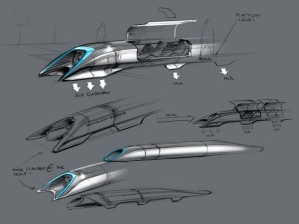
Visionary Tesla CEO Elon Musk had a grand idea for a new transportation system known as the Hyperloop. Now its development has taken one step closer to reality.
According to Stephen Edelstein of Green Car Reports, Musk first proposed the Hyperloop, a system of tubes and windowless pods, in the summer of 2013 through a white paper. A private company has attempted to develop Musk's concept into something functional.
"Hyperloop Transportation Technologies--the company that has taken charge of Hyperloop development, independent of Musk--has made a deal with landowners in central California on a site for its first test track," Edelstein wrote. "The track will span 5 miles near the busy Interstate 5 highway somewhere between San Francisco and Los Angeles."
According to Musk's white paper, he claimed that the Hyperloop would allow travel between Los Angeles and San Francisco in just 30 minutes. A combination of magnets and fans would propel the pods through tubes.
"Musk originally called for a top speed of 800 mph, but tests will be conducted at a more modest 200 mph," Edelstein wrote. "One reason for that is that engineers won't have the 100 miles of track Musk estimated would be needed for a pod to accelerate to 800 mph."
Ryan Citron of Navigant Research reported that the 5-mile pilot project would cost around $100 million to build. It is expected to be funded through an initial public offering from Hyperloop Transportation Technologies later this year. He then made a comparison with the costs associated with building high-speed rail in the state, which is overseen by the California High-Speed Rail Authority.
"With a 400-mile distance between Los Angeles and San Francisco, this system would cost about $8 billion to make the full trip between cities (assuming the costs of building the track and pods stay the same)," Citron wrote. "This is still far lower than the expected costs of California's high-speed rail, which comes in at a whopping $67.6 billion."
Citron pointed out that other major hurdles could challenge development of the new transportation system.
"Development costs are expected to be very high for this technology, and those costs are not factored into the $8 billion estimate (considers manufacturing costs only)," Citron wrote. "In order to continue developing the pods, capsules, and tubes to become commercially viable, this industry will need considerable cash."
According to Citron, even the "nature of the technology itself" will factor in to the hyperloop's success. The transportation's propulsion system will rely on the power of the sun.
"Transporting human beings through capsules at nearly 800 mph has yet to be proven a safe venture, and efforts to reduce the potentially nauseating effects will need to be worked out," Citron wrote. "Whether or not solar panels on the tubes would generate enough electricity to power the propulsion system is another concern of skeptics."
Edelstein reported that development of the hyperloop could face similar challenges that magnetic levitation trains, widely known as maglev, previously faced. Both options have been pitched as potential replacements to regular trains.
"As a completely new form of transportation, the Hyperloop can't lean on existing infrastructure or industries to speed development," Edelstein wrote. "It all must be made from scratch."






